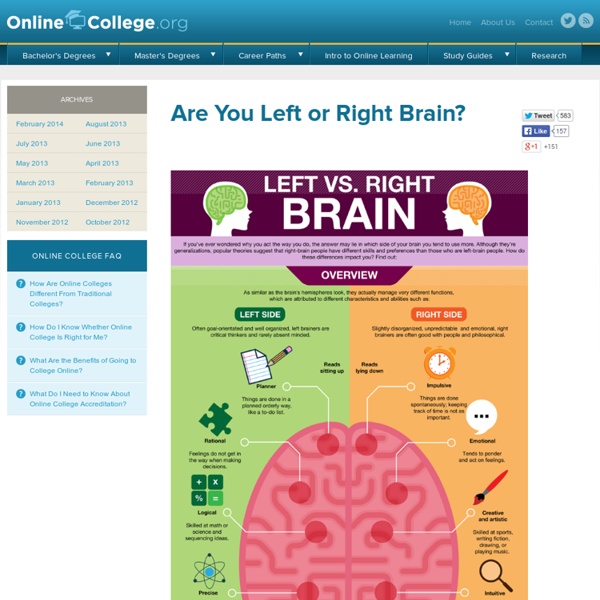



http://www.onlinecollege.org/left-or-right-brain/
Teaching the Gifted and Talented: 33 Websites Where You Can Find Good Resources I wish the Internet was available to me as a kid in elementary school. In New York City, where I attended kindergarten through sixth grade, they called the gifted and talented class "SP". I remember being put into a class to learn French, but very little else. I figured out how ahead I was only when I entered junior high school in New Jersey. How Do We Know When Students Are Engaged? (Updated 11/2013) Educational author and former teacher, Dr. Michael Schmoker shares in his book, Results Now, a study that found of 1,500 classrooms visited, 85 percent of them had engaged less than 50 percent of the students. In other words, only 15 percent of the classrooms had more than half of the class at least paying attention to the lesson.
Ten Takeaway Tips for Teaching Critical Thinking Suggestions from educators at KIPP King Collegiate High School on how to help develop and assess critical-thinking skills in your students. Ideally, teaching kids how to think critically becomes an integral part of your approach, no matter what subject you teach. But if you're just getting started, here are some concrete ways you can begin leveraging your students' critical-thinking skills in the classroom and beyond. 1. Questions, questions, questions.
Six Thinking Hats® Six Hats® ... A Critical and Creative Thinking Process that improves listening, speaking, reading and writing and is fun for ALL! Penn Hills PAGE Presentation Using Bibliotherapy with Gifted Children - Unwrapping the Gifted Hopefully we’ve all had that experience of reading a book that powerfully “spoke” to us, a book whose characters we could relate to, and whose struggles and triumphs we identified with. Taking this experience a step farther is the strategy of bibliotherapy, the process of helping the reader learn about and cope with any social or emotional struggles or developmental needs by identifying with a character in a book who shares a similar struggle or need. The reading is typically followed up by discussion with a trusted adult. Bibliotherapy of course can be done with all students, particularly students who might be experiencing a divorce in the family, a learning disability, adoption, etc. Today I want to talk a bit about using developmental bibliotherapy specifically with gifted students.
Reading Comprehension Worksheets "Your reading comprehension materials are the best I've found on the web. They are so thorough and comprehensive! My students and I have learned a lot from them. Thanks so much!" 15 Legitimate Ways Daydreaming Improves Thinking 15 Legitimate Ways Daydreaming Improves Thinking The student’s eyes drift to the classroom window and the teacher’s voice fades from consciousness. The daydream begins. It’s a familiar scene, one we have likely both experienced as students and struggled against in our students as teachers. But daydreaming is not what it might seem. Recent research in both psychology and neuroscience makes clear that daydreaming is an essential part of mental processing, reasoning and, yes, even learning.
Tips for Writing Instructional Objectives - Bloom's Taxonomy Job Aids I am so delighted to see this post that includes Bloom's Taxonomy Wheels by ZaidLearn. I always find that it's far easier to design materials using these wheels than it is to see the verbs/products in lists. Many instructional designers can benefit from these job aids when trying to find the right action verbs for their objectives. Here are some wheels for the cognitive domain. Source: Source: NRC/GT—Spring '98 Newsletter-Underachieving Gifted Students: A Mother's Perspective Pamela Hunter-Braden Boise State University Boise, ID I teach preschool. I have done so for long enough to watch a number of my students reach high school. Several have been identified as gifted, which came as no surprise since ability and potential often show themselves clearly at early ages.
The Differentiator Try Respondo! → ← Back to Byrdseed.com The Differentiator Marginal Learning Gains When it comes to Marginal Learning Gains, it is a real challenge to include QUESTIONING as an area where there could be a Marginal Learning Gain. There are many who would argue that if all we did was to concentrate on questioning, the gains for learning would be massive. With that in mind, the only way to include questioning in our suite of MLGs is to start to break it down into its own component parts. Integrating the 16 Habits of Mind In outcomes-based learning environments, we generally see three elements in play: 1) learning objectives or targets are created from given standards; 2) instruction of some kind is given; and then 3) learning results are assessed. These assessments offer data to inform the revision of further planned instruction. Rinse and repeat. But lost in this clinical sequence are the Habits of Mind that (often predictably) lead to success or failure in the mastery of given standards. In fact, it is not in the standards or assessments, but rather these personal habits where success or failure -- in academic terms -- actually begin. Below are all 16 Habits of Mind, each with a tip, strategy or resource to understand and begin implementation in your classroom.